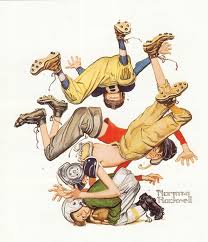Before and After: How a Rite of Passage Imparts a Permanent Change
In the movie, The Bourne Supremacy, Jason Bourne’s boss, Conklin, encourages him  before Bourne goes into a building to carry out his first assignment – kill a Russian politician. He has been trained and brainwashed to be an assassin for the CIA, and now is his first test. Conklin urges him on with the words, “see you on the other side.”
before Bourne goes into a building to carry out his first assignment – kill a Russian politician. He has been trained and brainwashed to be an assassin for the CIA, and now is his first test. Conklin urges him on with the words, “see you on the other side.”
The fact that there is “another side” means by implication that there is a barrier of some sort that must be crossed, or gone through. In Bourne’s case, it was the physical barrier of shooting another person, as well as the emotional barrier of committing the act. Conklin knew that once Jason had crossed that emotional barrier, he would be a different person because of it… he could do it again and again.
Although this may be a grisly way to make the point, this scenario perfectly illustrates a vital part of everyone’s life. The Rite of Passage. But just because it’s called a passage does not mean everyone goes through it. Only those who take up the challenge and summon the courage actually come out “on the other side.”
 It starts out in our youth. It could be a schoolyard wrestling match, or joining the military. Once you’ve done it, you know you can do more. It could be a one time mission or years of study in a college program, but then one day, POW! A diploma and job offers.
It starts out in our youth. It could be a schoolyard wrestling match, or joining the military. Once you’ve done it, you know you can do more. It could be a one time mission or years of study in a college program, but then one day, POW! A diploma and job offers.
In my article, “The Heart of a Pioneer” I try to articulate the inner desires and motives that drive someone to take the plunge, so to speak. There are compounded benefits, along with multiplied risks. But whether you  succeed or fail, there is one benefit no one can ever take away – you did it! You went through the gauntlet and you survived, and that very experience has left an indelible mark. It has changed you, and you are no longer the same. As a matter of fact, now that you
succeed or fail, there is one benefit no one can ever take away – you did it! You went through the gauntlet and you survived, and that very experience has left an indelible mark. It has changed you, and you are no longer the same. As a matter of fact, now that you
know you can do it, you may go for it again, and again, and again until you get it right.
There’s nothing wrong with refusing the Rite of Passage while others go on. Nothing bad will happen to you, and it may happen to them. But  you will experience what I call “The Agony of Not Trying.” You will simply stay the same, but you will never taste the delicious honor of victory. To a pioneer, even defeat contains a trace of victory. Why? Because he did it – he went for it – he came out “on the other side” – and he has left sameness behind.
you will experience what I call “The Agony of Not Trying.” You will simply stay the same, but you will never taste the delicious honor of victory. To a pioneer, even defeat contains a trace of victory. Why? Because he did it – he went for it – he came out “on the other side” – and he has left sameness behind.

